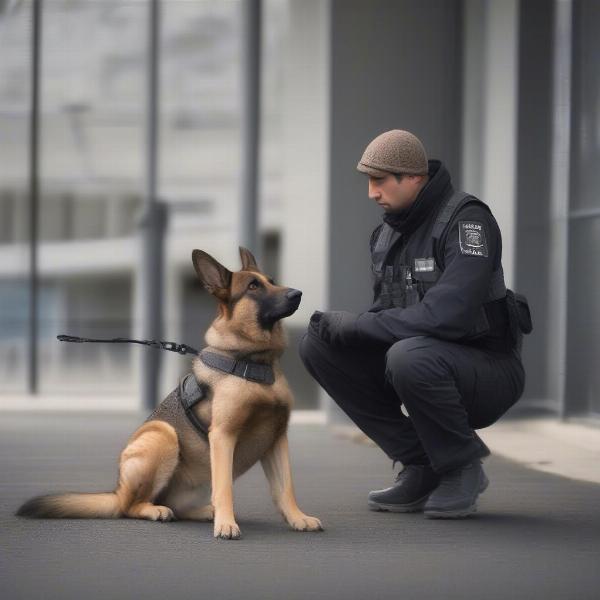Drug dogs are highly trained to detect a variety of illicit substances, and their keen sense of smell is a powerful tool in law enforcement. But just how powerful is that nose? Can they actually smell drugs hidden inside unopened carts? The answer, while not a simple yes or no, is generally leaning towards yes, they likely can. Let’s explore the factors influencing a drug dog’s ability to detect drugs in this specific scenario.
A drug dog’s ability to smell through unopened carts depends on several factors, including the type of drug, the amount present, the material of the cart, and the dog’s individual training and experience. While a sealed container might seem like a perfect hiding spot, it often isn’t enough to fool a well-trained canine.
Factors Affecting a Drug Dog’s Detection Ability
Several factors play a crucial role in a drug dog’s ability to detect drugs concealed within an unopened cart. Understanding these factors helps us grasp the complexities involved.
Type and Quantity of Drugs
Different drugs have different odors, and some are more pungent than others. Marijuana, for instance, has a strong, distinct smell that can easily permeate through materials. Cocaine, on the other hand, might be more difficult to detect in smaller quantities, especially if sealed tightly. The higher the quantity of the drug, the greater the chance of odor leakage and detection.
Cart Material and Construction
The material of the cart plays a significant role in odor containment. A porous material like cardboard offers less resistance to odor molecules compared to a dense plastic or metal cart. Even seemingly airtight containers can have microscopic gaps that allow minute traces of odor to escape.
The Dog’s Training and Experience
Drug dogs undergo rigorous training to identify specific drug scents. Their handlers play a crucial role in refining their skills and interpreting their signals. A highly experienced dog, with regular training and exposure to various concealment methods, is more likely to successfully detect drugs even in challenging scenarios like unopened carts.
How Drug Dogs Detect Scents
Drug dogs possess an incredibly sensitive olfactory system, far superior to humans. They have millions more scent receptors, allowing them to detect even the faintest traces of odor. When a drug dog encounters a scent it’s trained to recognize, it alerts its handler through specific behaviors, such as sitting, staring, or pawing at the source.
Air Currents and Particle Dispersion
Even with a sealed container, minute particles of the drug can escape and be carried by air currents. Drug dogs are trained to detect these tiny particles, which can cling to the outside of the cart or disperse into the surrounding air. Temperature fluctuations can also increase the release of odor molecules.
Legal Implications of Drug Dog Searches
While drug dogs are valuable tools, their use in searches is subject to legal regulations. In many jurisdictions, a drug dog’s alert can provide probable cause for a search, but the specific laws vary. It’s important to understand your rights regarding searches involving drug dogs.
 Drug dog alerting its handler
Drug dog alerting its handler
Challenging the Reliability of Drug Dog Alerts
The reliability of drug dog alerts can be challenged in court, particularly if there are questions about the dog’s training, the handler’s actions, or potential contamination of the scent. Factors such as the dog’s previous accuracy record and the presence of other interfering odors can also be considered.
Can Drug Dogs Smell Through Vacuum Sealed Bags?
While vacuum sealing significantly reduces odor leakage, it’s not foolproof against a highly trained drug dog. The pressure changes during handling can create micro-tears, releasing trace amounts of odor. Additionally, the scent can sometimes linger on the outside of the bag from prior contact.
Conclusion
So, can drug dogs smell unopened carts? The answer is a qualified yes. While several factors influence their ability to detect concealed drugs, their powerful sense of smell, combined with rigorous training, makes them highly effective. Understanding these factors can help you appreciate the complexities of canine scent detection and the legal implications surrounding drug dog searches.
FAQ
- How accurate are drug dogs? Drug dog accuracy varies depending on training and experience, but studies suggest they are generally reliable, though not infallible.
- Can I refuse a drug dog search? The legality of refusing a drug dog search varies depending on the jurisdiction and the specific circumstances.
- What can interfere with a drug dog’s sense of smell? Strong winds, other potent odors, and even the dog’s health can affect its ability to detect target scents.
- Are drug dogs trained to detect all types of drugs? Drug dogs are typically trained to detect specific sets of drugs, commonly including marijuana, cocaine, heroin, and methamphetamine.
- Can a drug dog smell through metal? While metal provides a good barrier, minute scent particles can still escape through seams or imperfections.
- Do drug dogs always indicate the presence of drugs correctly? False alerts can occur due to handler cues, contamination, or the dog’s misinterpretation of other scents.
- What should I do if a drug dog alerts on me? It’s important to remain calm and cooperate with law enforcement while understanding your legal rights.
About ILM Dog: ILM Dog is your trusted source for expert advice on all aspects of dog care, from breed selection and health to training and nutrition. We provide valuable resources for both new and experienced dog owners, helping you build a stronger bond with your furry friend. For personalized guidance or further information, contact us at [email protected] or +44 20-3965-8624. Discover the world of canine companionship with ILM Dog today! We offer specialized knowledge in breed selection, health and wellness, training, and nutrition.